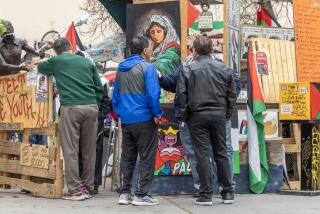Students Help Students as Peer Counselors, Street Psychologists--but Mostly, Just Friends
- Share via
Officially they are known as peer counselors; unofficially, they are street psychologists, who can get to the heart of an adolescent trauma much more quickly than most adults.
Some were learning counseling techniques for the first time, others brushing up on what they already had been practicing for two years or more. But they all came with a single purpose in mind--helping friends in trouble.
“You not only help other people,” said Denise Castro, a 14-year-old student at San Gabriel High School in Alhambra. “It helps you too.”
About 700 junior high and high school students had come from all over the state to attend the daylong workshop on peer counseling last month in the City of Industry. The topics of discussion ran from love relationships to homework, teen pregnancy, anorexia and suicide.
The students heard lectures from counselors, psychologists and teen-age victims, including some who had attempted suicide. Later the student counselors mingled, exchanged information and traded stories about their more difficult encounters.
The advanced group, mostly juniors and seniors in high school, had plenty of stories to tell. One, a 17-year-old boy from a high school in Los Angeles, said he used the skills he had developed to talk an aunt out of jumping off a pier. Another, who disapproved of abortion, said he persuaded a 15-year-old acquaintance to have her child, although she was unmarried and her mother was at the time unaware of her pregnancy.
Most, however, had done little or no counseling, and were there to learn the basics. There was plenty of good advice available.
“Speak to people, tell them the ground rules,” said 12-year-old Derrick Davis, a seventh-grader at Simons Junior High School in Pomona. “Then try to get their advice and their opinion on how they can handle it themselves.”
Derrick, who had done some counseling before the workshop, said one of his more difficult cases was a young man who refused to do his homework.
“I just told him, ‘If you don’t do it, how do you expect to learn anything?’ ”
There are a few tricks of the trade, said the students, that can help them get through the rough spots.
“Repeat what they say so they know you’re listening to them,” said Lisa Trevino, 12, a sixth-grader at Simons.
Another Simons seventh-grader, 13-year-old Henry Geyer, knew a good way to get out of an awkward silence. “If you don’t know what to say then say something like, ‘You sound real angry,’ ” he said.
Occasionally, however, no matter how smooth the technique, peer counseling can backfire. Eighth-grade Simons student Bobbi Ruiz said one boy poured out his secrets to her, and regretted it later. Apparently still in the midst of a a difficult stage of growing up that makes boys suspicious of girls, he began openly taunting her, fearing she would reveal his weaknesses to his friends.
“He regrets that he talked to a girl,” Bobbi said. “He thinks we have some kind of disease.”
The students said that no matter what the problem, the most effective counseling method is to listen carefully and make the troubled student feel as though he has an understanding friend.
“You have to have patience with the person,” said 15-year-old Julissa Camacho, a 10th-grader at San Gabriel High. “You can’t get everything out at once.”
More to Read
Sign up for Essential California
The most important California stories and recommendations in your inbox every morning.
You may occasionally receive promotional content from the Los Angeles Times.













